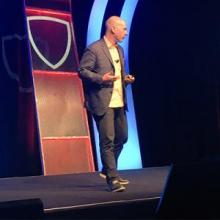MIT Researcher: How Businesses Can Stay Relevant In Rapidly Changing Tech World
Submitted by Sarah Kuranda on

In the early 1900s, the change from steam power to electricity created a profound period of disruption and turbulence in the manufacturing market, ultimately causing two-thirds of the companies at the time to go out of business or change drastically.
The market is at a similar inflection point right now with recent rapid innovations in technology, MIT Principal Research Scientist Andrew McAfee said at the Intel Security 2016 Partner Summit in Boca Raton, Fla. on Thursday. With it will come shifts in skill sets, culture and economics, he said, and solution providers and their customers have to be prepared if they want to survive.
"When these big tech surges come along, they require really different approaches, really different thinking and we can pretty safely predict there will be a lot of business turbulence and disruption in the years to come," McAfee said. (McAfee is not related to Intel Security founder John McAfee, he said.)
The change in technology has happened gradually over the past few decades, McAfee said, and is now shifting to a sudden acceleration in capabilities. Citing Moore's Law, McAfee said the technology growth spurt has reached the "second half of the chessboard," meaning it has been doubling in capabilities for so long that each increase is one of giant significance. That trajectory will only continue, he said.
"We ain't seen nothing yet," McAfee said. "We are going to see innovations that make all the other stuff we've seen so far look quaint."
The growing capabilities around machine learning are a key example of that, McAfee said. He cited the victory of IBM's Watson over top human competitors on the game show Jeopardy and the recent defeat of top world Go champions by a computer as examples of how far technology has come.
For businesses that want to stay relevant during this shift, McAfee said leaders will need to reconfigure how they balance human minds with machines. Second, he said a focus on platforms over products will be key as users move to prefer platform-centric solutions.
"If you have an inherently product-centric view of the world, when consumers and the users turn to valuable platforms, it's remarkable how chilly things can get for your business," McAfee said.
Finally, McAfee said management will have to embrace a key set of characteristics to evolve with changing technology. He said management should be open, iterative, experimental, and make data-dominated decisions.
These characteristics will prove key as businesses look to stay relevant, and in business, as they navigate this next era of technology, McAfee said.
"Not a single corner of the economy is immune [from these changes]," McAfee said. "Can successful companies of today navigate changes to come? It is going to be a thrilling ride."






